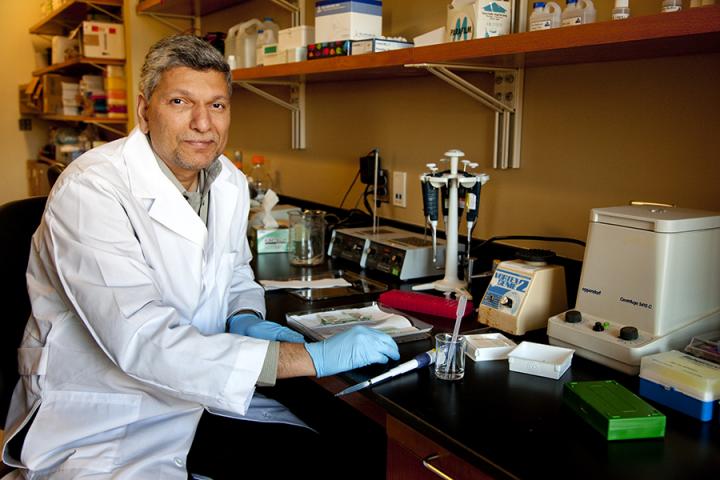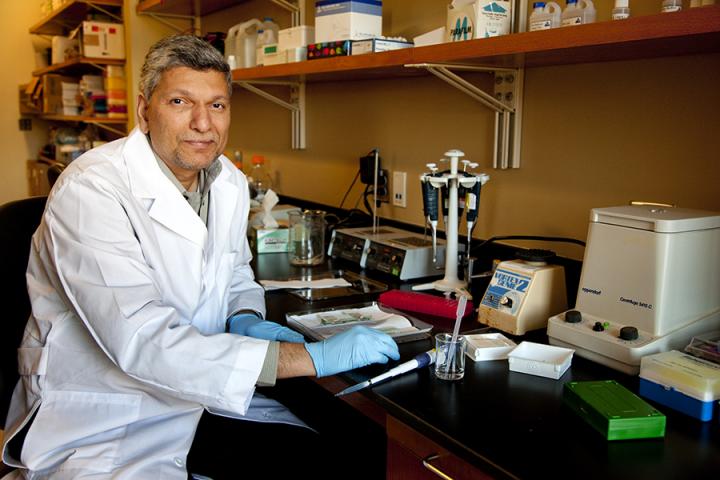
Credit: FSU College of Medicine
TALLAHASSEE, Fla. — While women have long been warned about the dangers of smoking during pregnancy, far less has been known about risks for offspring of men who smoke.
A new Florida State University College of Medicine study in mice produced results that suggest nicotine exposure in men could lead to cognitive deficits in their children and grandchildren. Further studies will be required to know if the same outcomes seen in mice would apply to humans.
"Our data raise the possibility that some of the cognitive disabilities found in today's generation of children and adults may be attributable to adverse environmental insults suffered a generation or two ago," said Pradeep Bhide, the Jim and Betty Ann Rodgers Eminent Scholar Chair of Developmental Neuroscience at the College of Medicine.
"Cigarette smoking was more common and more readily accepted by the population in the 1940s, '50s and '60s compared to today. Could that exposure be revealing itself as a marked rise in the diagnoses of neurodevelopmental disorders such as ADHD and autism?"
The results were published this week in the open-access journal PLOS Biology.
The study found that changes in the father's sperm attributed to nicotine exposure led to problems in genes that play a role in memory and learning. These epigenetic changes are believed to be temporary, Bhide said, though some could be long-lasting. More research is needed to understand how long the changes last, he said.
Bhide and College of Medicine colleagues Deirdre McCarthy and Cynthia Vied recently received a three-year National Institutes of Health grant to support additional work on molecular mechanisms underlying transgenerational transmission of the effects of paternal nicotine exposure.
Nicotine's harmful effects for cells in the lungs and brain are part of the body of evidence cited in the orders doctors give to avoid smoking. Absent in the conversation has been research demonstrating how nicotine affects germ cells — or changes DNA in the sperm.
Nicotine exposure for women is recognized as a significant risk factor for behavioral disorders such as ADHD. With men, there has not previously been enough evidence to separate genetic risk factors from environmental influences.
"Doctors may not warn men that their smoking could be harming their unborn child even if the mother never smoked," Bhide said. "I believe our study brings this to the fore."
McCarthy exposed male mice to low-dose nicotine in their drinking water during the stage of development when they are producing sperm. The mice were then bred with female mice never exposed to nicotine.
Though the fathers displayed normal behavioral tendencies, both their male and female offspring displayed hyperactivity, attention deficit and cognitive inflexibility.
"In analyzing spermatozoa from the father we found multiple genes with epigenetic changes," McCarthy said. "This includes the dopamine D2 gene, which has an important role in brain development and learning. This is the likely source for the cognitive deficits found in their descendants."
While the study was done in mice, previous studies on maternal nicotine exposure were consistent whether performed in mice or in women and children.
"I believe the findings from our study can be extrapolated to humans," Bhide said.
###
Media Contact
Doug Carlson
[email protected]
850-645-1255
@floridastate
http://www.fsu.edu
Original Source
https://med.fsu.edu/index.cfm?fuseaction=spotlight.viewArticle&usemenu=home&article=5839 http://dx.doi.org/10.1371/journal.pbio.2006497





